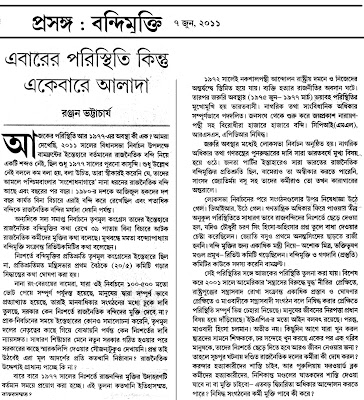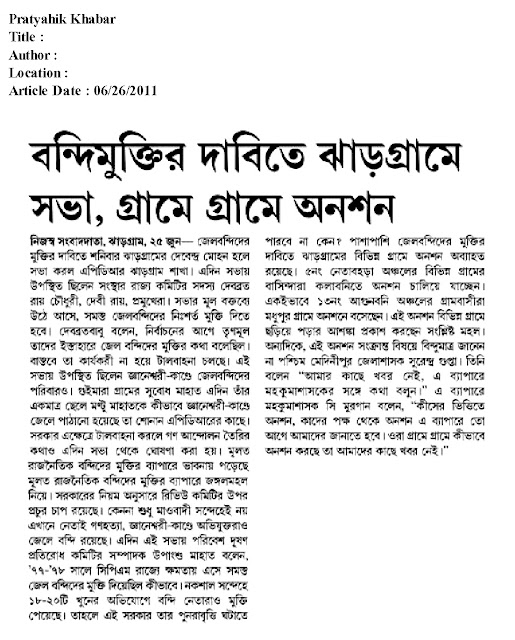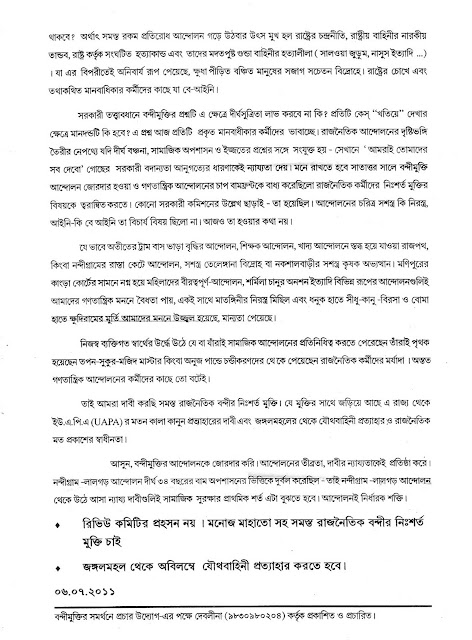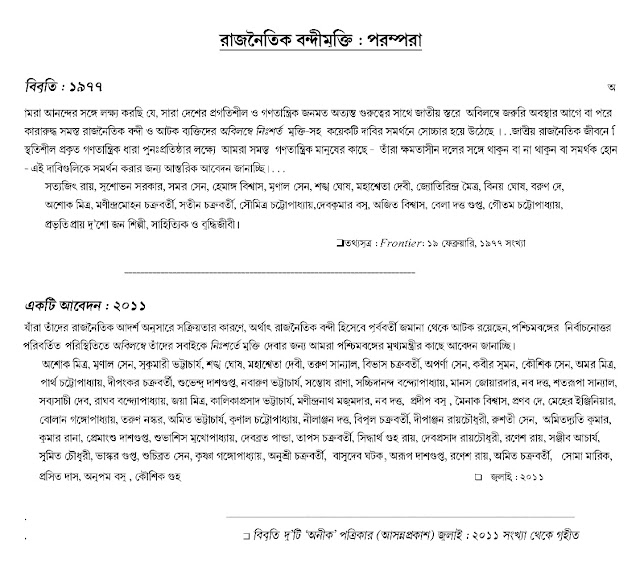Movement for unconditional release of
political prisoners in West Bengal
political prisoners in West Bengal
রাজনৈতিক বন্দীমুক্তি প্রসঙ্গে কলাম ও পত্রবিতর্ক
নীচের লেখাগুলো বড়ো করে পড়তে প্রতিটি লেখার উপর দু'বার মাউস ক্লিক্ করুন
গত ৭ জুন ২০১১, 'একদিন' সংবাদপত্রে প্রকাশিত রঞ্জন ভট্টাচার্যের কলাম
গত ২৩ জুন ২০১১, 'একদিন' সংবাদপত্রের 'ডাকবাক্স' বিভাগে প্রকাশিত পত্রাবলী
'প্রাত্যহিক খবর' ২৬ জুন, ২০১১
'প্রাত্যহিক খবর' ২৮ জুন, ২০১১
'বন্দীবার্তা' পত্রিকার জুলাই ২০১১ সংখ্যায় প্রকাশিত প্রতিবেদন
'বন্দীবার্তা' পত্রিকার জুলাই ২০১১ সংখ্যায় প্রকাশিত খবর ও প্রেস বিবৃতি
'দৈনিক স্টেটস্ম্যান' সংবাদপত্রে রথীন পালচৌধুরীর প্রতিবেদন
'অনীক' জুলাই, ২০১১ সংখ্যায় প্রকাশিত দীপংকর চক্রবর্তীর প্রবন্ধ পড়ুন
(সৌজন্য- অনীক)
বন্দীমুক্তি আন্দোলন : ঐতিহ্য, পরম্পরা ও সাম্প্রতিক বিতর্ক
'অনীক' জুন, ২০১১ সংখ্যায় প্রকাশিত সঞ্জীব আচার্য্যের প্রবন্ধ পড়ুন
'অনীক' জুন, ২০১১ সংখ্যায় প্রকাশিত সঞ্জীব আচার্য্যের প্রবন্ধ পড়ুন
(সৌজন্য- অনীক)
সমস্ত রাজনৈতিক বন্দীর নিঃশর্ত মুক্তি চাই- সঞ্জীব আচার্য্য- অনীক জুন, ২০১১
'বন্দীবার্তা' পত্রিকার জুলাই ২০১১ সংখ্যায় প্রকাশিত সম্পাদকীয় প্রতিবেদন পড়ুন
'বন্দীবার্তা' পত্রিকার জুলাই ২০১১ সংখ্যায় প্রকাশিত সম্পাদকীয় প্রতিবেদন পড়ুন
(সৌজন্য- বন্দীবার্তা)
পশ্চিমবাংলার কারাগারগুলিতে রাজবন্দী কারা? আমরা কাদের মুক্তি চাইছি?
'বন্দীবার্তা' পত্রিকার জুলাই ২০১১ সংখ্যায় প্রকাশিত অমিত ভট্টাচার্যের প্রবন্ধ পড়ুন
পশ্চিমবাংলার কারাগারগুলিতে রাজবন্দী কারা? আমরা কাদের মুক্তি চাইছি?
'বন্দীবার্তা' পত্রিকার জুলাই ২০১১ সংখ্যায় প্রকাশিত অমিত ভট্টাচার্যের প্রবন্ধ পড়ুন
(সৌজন্য- বন্দীবার্তা)
কেন আমরা রাজবন্দীদের নিঃশর্ত মুক্তি দাবি করছি?
কেন আমরা রাজবন্দীদের নিঃশর্ত মুক্তি দাবি করছি?
সব্যসাচী গোস্বামীর প্রবন্ধটি পড়তে নীচের লিংকে ক্লিক করুন
(সৌজন্য- বন্দীবার্তা)
২২ জুন, ২০১১-এ 'দৈনিক স্টেটস্ম্যান' পত্রিকায় প্রকাশিত রথীন পালচৌধুরীর প্রতিবেদন এবং তার প্রেক্ষিতে 'বন্দীবার্তা'-র সম্পাদকমণ্ডলীর খোলা চিঠি পড়তে নীচের লিংকে ক্লিক্ করুন
(সৌজন্য- বন্দীবার্তা)
'বন্দীবার্তা' পত্রিকা সংগ্রহ করতে নীচের ঠিকানায় যোগাযোগ করুন
প্রকাশক- শুক্লা ভৌমিক
৩৬এ, সেন্ট্রাল রোড, যাদবপুর, কলকাতা- ৭০০০৩২
দূরভাষ- ৯৮৩১৪০৭৭৮৫
মানবাধিকার আন্দোলনের কর্মী নীলাঞ্জন দত্ত 'সংবাদ মন্থন' পত্রিকার কিছু প্রশ্নের উত্তর দিয়েছেন, ১৪ সেপ্টেম্বর, কলকাতা
প্রশ্নোত্তরে রাজনৈতিক বন্দী মুক্তি আন্দোলন (সৌজন্য- সংবাদ মন্থন, ১৬ সেপ্টেম্বর ২০১১)
৩৬এ, সেন্ট্রাল রোড, যাদবপুর, কলকাতা- ৭০০০৩২
দূরভাষ- ৯৮৩১৪০৭৭৮৫
মানবাধিকার আন্দোলনের কর্মী নীলাঞ্জন দত্ত 'সংবাদ মন্থন' পত্রিকার কিছু প্রশ্নের উত্তর দিয়েছেন, ১৪ সেপ্টেম্বর, কলকাতা
প্রশ্নোত্তরে রাজনৈতিক বন্দী মুক্তি আন্দোলন (সৌজন্য- সংবাদ মন্থন, ১৬ সেপ্টেম্বর ২০১১)
'নিঃশর্ত বন্দিমুক্তি'-র দাবিতে ১১ জুলাই ২০১১-য় অনুষ্ঠিত গণকনভেনশনের লিফলেট


'টাইমস্ অফ ইন্ডিয়া'র খবর (১২ জুলাই, ২০১১) -"নিঃশর্ত বন্দিমুক্তি"-র দাবিতে গণকনভেশন
'আনন্দবাজার পত্রিকা' (১২ জুলাই, ২০১১)
যৌথ বাহিনী প্রত্যাহার, বন্দিমুক্তির দাবি সুমনের
"প্রাত্যহিক খবর" (১২ জুলাই, ২০১১)
'দ্য টেলিগ্রাফ' পত্রিকায় প্রকাশিত প্রতিবেদন, ১৫ জুলাই ২০১১
Mahasweta demands prisoner release
'দ্য সান্ডে ইন্ডিয়ান'-এ সুকুমার মিত্রের প্রতিবেদন, ১৫ জুলাই ২০১১
"প্রাত্যহিক খবর", ১৭ জুলাই ২০১১-এ প্রকাশিত খবর

'গণতান্ত্রিক অধিকার রক্ষা সমিতি' (এপিডিআর)-এর প্রেস রিলিজ
হুগলী জেলা এপিডিআর-এর স্মারকলিপি (সৌজন্য- সংহতি)
Memorandum on political prisoners submitted by APDR to the Hooghly district administration June 26, 2011
'দ্য হিন্দু'-র খবর ( ২ জুন, ২০১১) পড়তে নীচের লিংকে ক্লিক্ করুন
Rights bodies demand general amnesty for political prisoners in West Bengal June 2, 2011
'দ্য হিন্দু'-র খবর (৫ জুন, ২০১১) পড়তে নীচের লিংকে ক্লিক করুন
Panel to review release of political prisoners in Bengal
'দ্য স্টেটস্ম্যান'-এর খবর (৮ জুন, ২০১১)
APDR demands unconditional release of ‘political prisoners’
স্নিগ্ধেন্দু ভট্টাচার্যের প্রতিবেদন (হিন্দুস্তান টাইমস্, ২০ জুন ২০১১)
Terms for prisoner release sparks debate June 20, 2011
'ইন্ডিয়ান এক্সপ্রেস'-এর খবর (১৭ জুন, ২০১১)
Rights bodies differ with Govt stand
'দ্য স্টেটস্ম্যান'-এর খবর (২৩ জুন, ২০১১)
Political prisoners observe hunger-strike demanding unconditional release 23 June 2011
'টাইমস্ অফ ইণ্ডিয়া'র খবর (২৪ জুন, ২০১১)
APDR demands release of political prisoners Sujoy Khanra, Jun 24, 2011
দীপাঞ্জন রায়চৌধুরীর কলাম, ৬ জুন ২০১১ (সৌজন্য- সংহতি)
Release of Prisoners: To Talk or Not to Talk to Mamata Banerjee June 6, 2011
রঞ্জিত শূর ও দীপাঞ্জন রায়চৌধুরীর আলোচনা (সৌজন্য-সংহতি)
Discussions on the release of political prisoners-Whose committee is it ?
'কাউন্টারকারেন্টস্'-এ রঞ্জিত শূরের কলাম (৪ জুলাই, ২০১১)
West Bengal Movement for Release of Political Prisoners By Ranjit Sur, 04 July, 2011
'দ্য ন্যাশনাল'-এর প্রতিবেদন ( ২২ মে, ২০১১)
Brutal world of India's political prisoners by Eric Randolph May 22, 2011 'হিন্দুস্তান টাইমস্'-এর খবর (২২ জুন, ২০১১)
No list of political prisoners in Singur, Nandigram
'টাইমস্ অফ ইন্ডিয়া'র খবর (২ জুলাই, ২০১১)
Monoj Mahato back in prison, rights activists slam govt; Jul 2, 2011
'ইন্ডিয়ান এক্সপ্রেস'-এর খবর (৮ জুলাই, ২০১১)
Junglemahal: Mamata to free 46 prisoners
'টাইমস্ অফ ইন্ডিয়া'-র খবর (৮ জুলাই ২০১১)
Create congenial atmosphere for talks: Interlocutors to Mamata
"দ্য টাইমস্ অফ ইন্ডিয়া"য় প্রকাশিত খবর, ১৯ জুলাই ২০১১
Rights body for release of political prisoners, The Times of India, 19 July 2011
"আনন্দবাজার পত্রিকা"য় প্রকাশিত খবর, ১৯ জুলাই ২০১১
মাওবাদী নেতাদেরও মুক্তি চেয়ে সুপারিশ
"আনন্দবাজার পত্রিকা"য় প্রকাশিত তাপস সিংহ-র কলাম, ১৯ জুলাই ২০১১
"আনন্দবাজার পত্রিকা"য় প্রকাশিত তাপস সিংহ-র কলাম, ১৯ জুলাই ২০১১
"আনন্দবাজার পত্রিকা"য় প্রকাশিত অসীম চট্টোপাধ্যায়-এর কলাম, ১৯ জুলাই ২০১১
নিঃশর্ত বন্দিমুক্তি কেন চাই- অসীম চট্টোপাধ্যায়
নিঃশর্ত বন্দিমুক্তি কেন চাই- অসীম চট্টোপাধ্যায়
"ইন্ডিয়ান এক্সপ্রেস" পত্রিকায় প্রকাশিত খবর ৬ সেপ্টেম্বর ২০১১
In 3 months of panel’s life, 4 political prisoners freed
১৩ সেপ্টেম্বর,২০১১ বিপ্লবী যতীন দাসের শহীদ দিবসে সমস্ত রাজনৈতিক বন্দীর নিঃশর্ত মুক্তির দাবিতে কলকাতার কলেজ স্কোয়ারে 'বন্দীমুক্তি কমিটি'র উদ্যোগে আয়োজিত গণ অবস্থান-এর খবর ‘টাইমস্ অফ ইন্ডিয়া’ ১৪ সেপ্টেম্বর, ২০১১
Maoists climb down on talks conditions, The Times Of India, 14 September 2011
রাজনৈতিক বন্দীমুক্তি প্রসঙ্গে 'ফ্রেন্ডস্ অফ ডেমোক্রেসি'-র প্রেস রিলিজ
Maoists climb down on talks conditions, The Times Of India, 14 September 2011
‘
প্রাত্যহিক খবর’এ প্রকাশিত রঞ্জিত শূরের উত্তর সম্পাদকীয় কলাম, ১৪ সেপ্টেম্বর ২০১১
রাজনীতির ঘূর্ণাবর্তে বন্দীমুক্তি আন্দোলন - রঞ্জিত শূর
প্রাত্যহিক খবর’এ প্রকাশিত রঞ্জিত শূরের উত্তর সম্পাদকীয় কলাম, ১৪ সেপ্টেম্বর ২০১১
রাজনীতির ঘূর্ণাবর্তে বন্দীমুক্তি আন্দোলন - রঞ্জিত শূর
রাজনৈতিক বন্দীমুক্তি প্রসঙ্গে 'ফ্রেন্ডস্ অফ ডেমোক্রেসি'-র প্রেস রিলিজ
'বন্দীমুক্তির সমর্থনে প্রচার উদ্যোগ'-এর পক্ষ থেকে অমিত ভট্টাচার্য কর্তৃক প্রকাশিত পুস্তিকাটি পড়তে নীচের লিংকে ক্লিক করুন
'প্রসঙ্গ সমকাল', 'ঈক্ষণ', 'বর্তমান লোকায়তিক', 'অধিকার পত্র', 'আকিঞ্চন', 'আসানসোল শিল্পাঞ্চলের উদ্যোগ', 'বাসভূমি' (বহরমপুর), 'উৎস মানুষ', 'গণসংস্কৃতি', 'তৃতীয় পক্ষ' ইত্যাদি পত্রিকা ও চাকদহ বিজ্ঞান ও সাংস্কৃতিক সংস্থা কর্তৃক প্রকাশিত লিফলেট
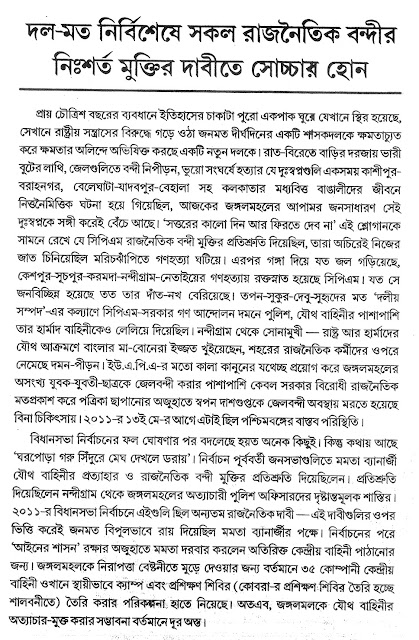
১১ জুলাই, ২০১১-এর গণকনভেনশনে বিলি করা বন্দীমুক্তি কমিটি, জঙ্গলমহলের লিফলেট
(এপিডিআর-এর বন্ধুদের সৌজন্যে প্রাপ্ত)
পিপলস্' লিটারারি কালচারাল ইউনাইটেড ফোরাম-এর পক্ষ থেকে
আহ্বায়ক কাঞ্চন কুমারের আবেদন
১৫ জুলাই, ২০১১ 'প্রাত্যহিক খবর' সংবাদপত্রে প্রকাশিত শুভেন্দু দাশগুপ্তের কলাম

জঙ্গলমহলের দাবিপত্র
(এপিডিআর-এর বন্ধুদের সৌজন্যে প্রাপ্ত)
পুলিশি সন্ত্রাস বিরোধী জনসাধারণের কমিটি-র দাবিপত্র
(এপিডিআর-এর বন্ধুদের সৌজন্যে প্রাপ্ত)
পুলিশি সন্ত্রাস বিরোধী জনসাধারণের কমিটি-র দাবিপত্র
১৩ এপ্রিল, ২০১১-এ "বন্দিমুক্তি কমিটি"-র কনভেনশন উপলক্ষে
A Benglai leaflet published by Struggling Workers’ Centre (SWC)
'দৈনিক স্টেটস্ম্যান'-এ লেখা মহাশ্বেতা দেবীর কলাম
'অনীক' পত্রিকার মে, ২০১১ সংখ্যায় পুনর্মুদ্রিত অশোক মিত্রের কলাম
(প্রথম প্রকাশ এপ্রিল, ১৯৭৭-এ আনন্দবাজার পত্রিকায়)
সৌজন্য: 'অনীক' পত্রিকা
১২ জুলাই, ২০১১ "প্রাত্যহিক খবর"-এ প্রকাশিত সুমনকল্যাণ মৌলিকের প্রতিবেদন
দেশবিদেশের রাজবন্দী কবিদের কবিতা সংকলন
'মুক্ত করো রাজবন্দীদের' - সংকলন ও ভাষান্তর: কাঞ্চন কুমার, প্রথম প্রকাশ- ২১ সেপ্টেম্বর ২০১১
রাজনৈতিক বন্দিমুক্তি প্রসঙ্গে রবীন্দ্রনাথ ঠাকুর
(সৌজন্য- নীলাঞ্জন দত্ত সম্পাদিত 'মানবাধিকার' রবীন্দ্রনাথ ঠাকুর-এর প্রবন্ধ, ভাষণ, পত্র ও বিবৃতি; প্রকাশক- এপিডিআর)
'মুক্ত করো রাজবন্দীদের' - সংকলন ও ভাষান্তর: কাঞ্চন কুমার, প্রথম প্রকাশ- ২১ সেপ্টেম্বর ২০১১
রাজনৈতিক বন্দিমুক্তি প্রসঙ্গে রবীন্দ্রনাথ ঠাকুর
(সৌজন্য- নীলাঞ্জন দত্ত সম্পাদিত 'মানবাধিকার' রবীন্দ্রনাথ ঠাকুর-এর প্রবন্ধ, ভাষণ, পত্র ও বিবৃতি; প্রকাশক- এপিডিআর)
রাজবন্দি কাজী নজরুল ইসলাম
ডঃ আব্দুর রহিমের লেখা প্রবন্ধটি পড়তে নীচের লিংকে ক্লিক্ করুন
(সৌজন্য- 'আমার দেশ', ঢাকা, বাংলাদেশ)
কারাবন্দি নজরুল - ডঃ আব্দুর রহিম
"রাজবন্দীর জবানবন্দী" - কাজী নজরুল ইসলাম (সৌজন্য- সোনার বাংলাদেশ)
নজরুল রচনাবলী প্রথম খণ্ড, বাংলা একাডেমী, নজরুল-জন্মশতবর্ষ সংস্করণ প্রথম খণ্ড, ১১ জ্যৈষ্ঠ ১৪১৩, মে ২০০৬ থেকে পুনর্মুদ্রিত
রাজবন্দীর জবানবন্দী- কাজী নজরুল ইসলাম, প্রেসিডেন্সি জেল, কলিকাতা ৭ জানুয়ারি ১৯২৩

ডঃ আব্দুর রহিমের লেখা প্রবন্ধটি পড়তে নীচের লিংকে ক্লিক্ করুন
(সৌজন্য- 'আমার দেশ', ঢাকা, বাংলাদেশ)
কারাবন্দি নজরুল - ডঃ আব্দুর রহিম
"রাজবন্দীর জবানবন্দী" - কাজী নজরুল ইসলাম (সৌজন্য- সোনার বাংলাদেশ)
নজরুল রচনাবলী প্রথম খণ্ড, বাংলা একাডেমী, নজরুল-জন্মশতবর্ষ সংস্করণ প্রথম খণ্ড, ১১ জ্যৈষ্ঠ ১৪১৩, মে ২০০৬ থেকে পুনর্মুদ্রিত
রাজবন্দীর জবানবন্দী- কাজী নজরুল ইসলাম, প্রেসিডেন্সি জেল, কলিকাতা ৭ জানুয়ারি ১৯২৩
